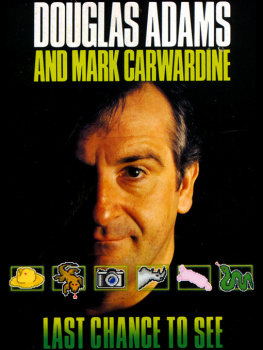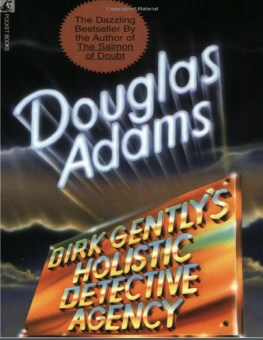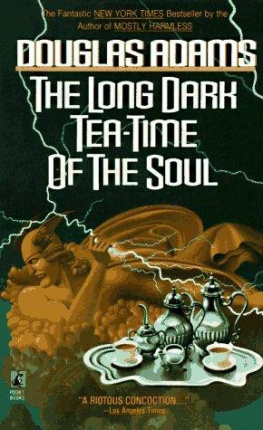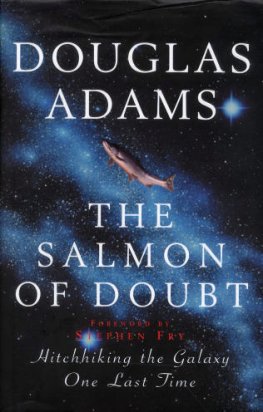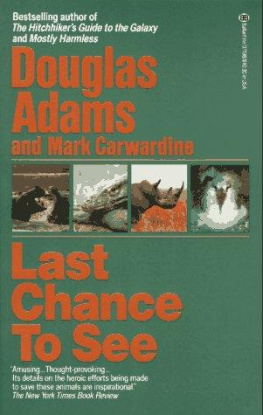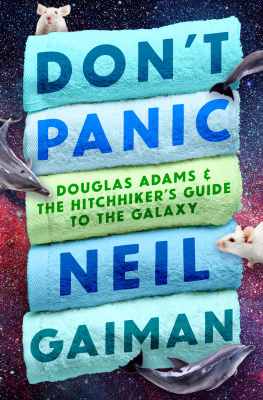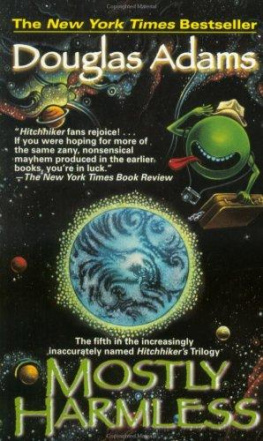Douglas Adams - Last Chance to See
Here you can read online Douglas Adams - Last Chance to See full text of the book (entire story) in english for free. Download pdf and epub, get meaning, cover and reviews about this ebook. year: 1992, publisher: Ballantine Books, genre: Detective and thriller. Description of the work, (preface) as well as reviews are available. Best literature library LitArk.com created for fans of good reading and offers a wide selection of genres:
Romance novel
Science fiction
Adventure
Detective
Science
History
Home and family
Prose
Art
Politics
Computer
Non-fiction
Religion
Business
Children
Humor
Choose a favorite category and find really read worthwhile books. Enjoy immersion in the world of imagination, feel the emotions of the characters or learn something new for yourself, make an fascinating discovery.
- Book:Last Chance to See
- Author:
- Publisher:Ballantine Books
- Genre:
- Year:1992
- Rating:3 / 5
- Favourites:Add to favourites
- Your mark:
- 60
- 1
- 2
- 3
- 4
- 5
Last Chance to See: summary, description and annotation
We offer to read an annotation, description, summary or preface (depends on what the author of the book "Last Chance to See" wrote himself). If you haven't found the necessary information about the book — write in the comments, we will try to find it.
Last Chance to See — read online for free the complete book (whole text) full work
Below is the text of the book, divided by pages. System saving the place of the last page read, allows you to conveniently read the book "Last Chance to See" online for free, without having to search again every time where you left off. Put a bookmark, and you can go to the page where you finished reading at any time.
Font size:
Interval:
Bookmark:
Douglas Adams
and Mark Carwardine
Last Chance to See ...
For Alain le Garsmeur
With special thanks to
Sue Freestone and Lisa Glass
for editing, research and being there
CONTENTS
This isn't at all what I expected. In 1985, by some sort of journalistic accident I was sent to Madagascar with Mark Carwardine to look for an almost extinct form of lemur called the aye-aye. None of the three of us had met before. I had never met Mark, Mark had never met me, and no one, apparently, had seen an aye-aye in years.
This was the idea of the Observer Colour Magazine, to throw us all in at the deep end. Mark is an extremely experienced and knowledgeable zoologist, working at that time for the World Wildlife Fund, and his role, essentially, was to be the one who knew what he was talking about. My role, and one for which L was entirely qualified, was to be an extremely ignorant non-zoologist to whom everything that happened would come as a complete surprise. All the aye-aye had to do was do what aye-ayes have been doing for millions of years - sit in a tree and hide.
The aye-aye is a nocturnal lemur. It is a very strange-looking creature that seems to have been assembled from bits of other animals. It looks a little like a large cat with a bat's ears, a beaver's teeth, a tail like a large ostrich feather, a middle finger like a long dead twig and enormous eyes that seem to peer past you into a totally different world which exists just over your left shoulder.
Like virtually everything that lives on Madagascar, it does not exist anywhere else on earth. Its origins date back to a period in earth's history when Madagascar was still part of mainland Africa (which itself had been part of the gigantic supercontinent of Gondwanaland), at which time the ancestors of the Madagascan lemurs were the dominant primate in all the world. When Madagascar sheered off into the Indian Ocean it became entirely isolated from all the evolutionary changes that took place in the rest of the world. It is a life-raft from a different time. It is now almost like a tiny, fragile, separate planet.
The major evolutionary change which passed Madagascar by was the arrival of the monkeys. These were descended from the same ancestors as the lemurs, but they had bigger brains, and were aggressive competitors for the same habitat. Where the lemurs had been content to hang around in trees having a good time, the monkeys were ambitious, and interested in all sorts of things, especially twigs, with which they found they could do all kinds of things that they couldn't do by themselves - digging for things, probing things, hitting things. The monkeys took over the world and the lemur branch of the primate family died out everywhere - other than Madagascar, which for millions of years the monkeys never reached.
Then fifteen hundred years ago, the monkeys finally arrived, or at least, the monkey's descendants - us. Thanks to astounding advances in twig technology we arrived in canoes, then boats and finally aeroplanes, and once again started to compete for use of the same habitat, only this time with fire and machetes and domesticated animals, with asphalt and concrete. The lemurs are once again fighting for survival.
My aeroplane full of monkey descendants arrived at Antananarivo airport. Mark, who had gone out ahead to make the arrangements for the expedition, met me for the first time there and explained the set-up.
'Everything's gone wrong,' he said.
He was tall, dark and laconic and had a slight nervous tic. He explained that he used to be just tall, dark and laconic, but that the events of the last few days had rather got to him. At least he tried to explain this. He had also lost his voice, he croaked, due to a lot of recent shouting.
'I nearly telexed you not to come,' he said. `The whole thing's a nightmare. I've been here for five days and I'm still waiting for something to go right. The Ambassador in Brussels promised me that the Ministry of Agriculture would be able to provide us with two Landrovers and a helicopter. Turns out all they've got is a moped and it doesn't work.
'The Ambassador in Brussels also assured me that we could drive right to the north, but the road suddenly turns out to be impassable because it's being rebuilt by the Chinese, only we're not supposed to know that. And exactly what is meant by 'suddenly' I don't know because they've apparently been at it for ten years.
'Anyway, I think I've managed to sort something out, but we have to hurry,' he added `The plane to the jungle leaves in two hours and we have to be on it. We've just got time to dump your surplus baggage at the hotel if we're quick. Er, some of it is surplus, isn't it? He looked anxiously at the pile of bags that I .was lugging, and then with increasing alarm at the cases of Nikon camera bodies, lenses and tripods that our photographer, Alain le Garsmeur, who had been with me on the plane, was busy loading into the minibus.
'Oh, that reminds me,' he said, `I've just found out that we probably won't be allowed to take any film out of the country.'
I climbed rather numbly into the minibus. After thirteen hours on the plane from Paris I was tired and disoriented and had been looking forward to a shower, a shave, a good night's sleep and then maybe a gentle morning trying gradually to find Madagascar on the map over a pot of tea. I tried to pull myself together and get a grip. I suddenly had not the faintest idea what I, a writer of humorous science fiction adventures, was doing here. I sat blinking in the glare of the tropical sun and wondered what on earth Mark was expecting of me. He was hurrying around, tipping one porter, patiently explaining to another porter that he hadn't actually carried any of our bags, conducting profound negotiations with the driver and gradually pulling some sort of order out of the chaos.
Madagascar, I thought. Aye-aye, I thought. A nearly extinct lemur. Heading out to the jungle in two hours' time. I desperately needed to sound bright and intelligent.
'Er, do you think we're actually going to get to see this animal? I asked Mark as he climbed in and slammed the door. He grinned at me.
`Well, the Ambassador to Brussels said we hadn't got a hope in hell,' he said, 'so we may just be in with a chance. Welcome,' he added as we started the slow pothole slalom into town, 'to Madagascar.'
Antananarivo is pronounced Tananarive, and for much of this century has been spelt that way as well. When the French took over Madagascar at the end of the last century (colonised is probably too kind a word for moving in on a country that was doing perfectly well for itself but which the French simply took a fancy to), they were impatient with the curious Malagasy habit of not bothering to pronounce the first and last syllables of place names. They decided, in their rational Gallic way, that if that was how the names were pronounced then they could damn well be spelt that way too. It would be rather as if someone had taken over England and told us that from now on we would be spelling Leicester 'Lester' and liking it. We might be forced to spell it that way, but we wouldn't like it, and neither did the Malagasy. As soon as they managed to divest themselves of French rule, in 1960, they promptly reinstated all the old spellings and just kept the cooking and the bureaucracy.
One of the more peculiar things that has happened to me is that as a result of an idea I had as a penniless hitch-hiker sleeping in fields and telephone boxes, publishers now send me round the world on expensive author tours and put me up in the sort of hotel room where you have to open several doors before you find the bed. In fact I had just arrived directly from a US author tour which was exactly like that, and so my first reaction to finding myself sleeping on concrete floors in spider-infested huts in the middle of the jungle was, oddly enough, one of fantastic relief. Weeks of mind-numbing American Expressness dropped away like mud in the shower and I was able to lie back and enjoy being wonderfully, serenely, hideously uncomfortable. I could tell that Mark didn't realise this and was at first rather anxious showing me to my patch of floor -'Er, will this be all right? I was told there would be mattresses ... um, can we fluff' up the concrete a little for you?' and I had to keep on saying, 'You don't understand. This is great, this is wonderful, I've been looking forward to this for weeks.'
Font size:
Interval:
Bookmark:
Similar books «Last Chance to See»
Look at similar books to Last Chance to See. We have selected literature similar in name and meaning in the hope of providing readers with more options to find new, interesting, not yet read works.
Discussion, reviews of the book Last Chance to See and just readers' own opinions. Leave your comments, write what you think about the work, its meaning or the main characters. Specify what exactly you liked and what you didn't like, and why you think so.

